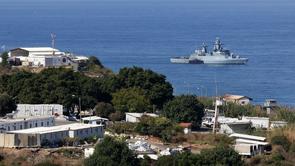 A United Nations ship is pictured in the southernmost area of Naqura, by the border with Israel, on Oct 14, 2020. Lebanon and Israel, still technically at war, are holding talks sponsored by the United Nations and the United States to settle a maritime border dispute and clear the way for oil and gas exploration. (MAHMOUD ZAYYAT / AFP)
A United Nations ship is pictured in the southernmost area of Naqura, by the border with Israel, on Oct 14, 2020. Lebanon and Israel, still technically at war, are holding talks sponsored by the United Nations and the United States to settle a maritime border dispute and clear the way for oil and gas exploration. (MAHMOUD ZAYYAT / AFP)
JERUSALEM - Israel's Security Cabinet voted Wednesday in favor of a landmark agreement with Lebanon to demarcate a maritime border between the two countries.
The vote was the first in several procedures needed before Israel's final approval of the US-brokered deal.
Prime Minister Yair Lapid's office said in a statement that the Security Cabinet, which is made up of the government's senior ministers, unanimously voted in favor of endorsing the agreement with one minister abstaining, meaning the deal will be put to a vote by the entire government.
The vote was the first in several procedures needed before Israel's final approval of the US-brokered deal
The government will discuss the deal later on Wednesday, according to the office, although it did not specify when the vote will take place.
ALSO READ: Israeli, Lebanese leaders say maritime border deal reached
The vote on the draft deal came a day after both Lapid and Lebanese President Michel Aoun announced in two separate statements that the draft agreement met their countries' demands. Later on Tuesday, Lapid and US President Joe Biden talked over the phone and hailed the deal as "historic.
Being the first diplomatic agreement between the two countries, which have been in a state of war since the founding of Israel in 1948, the maritime demarcation deal settles a longtime dispute over a region in the eastern Mediterranean, where gas fields are located.
The agreement, a copy of which Xinhua has seen, set terms for the exploration and exploitation rights of the gas fields.
Under the agreement, Qana, a natural gas field partially located in a zone claimed by Israel, would be owned by Lebanon. Total, a French energy giant, will explore the gas field and compensate Israel by sharing some revenues with it.
ALSO READ: Israel welcomes US proposal for Lebanon maritime border
Karish, an Israeli-developed natural gas field located some 90 km offshore of Israel, will stay inside the Israeli maritime boundaries.
The deal will come into effect once Israel and Lebanon send letters to the United Nations stating their agreement.
Production at the Karish rig and the exploration of Qana are expected to begin immediately after the agreement enters into force, the deal says.
The deal faces several political and legal challenges in Israel, however.
READ MORE: Lebanon eyes quick conclusion to border talks with Israel
On Wednesday, the Israeli Supreme Court rejected a petition by a far-right group to freeze the procedures to approve the deal, because the country will hold in two-and-a-half weeks its fifth round of parliamentary elections since 2019.


